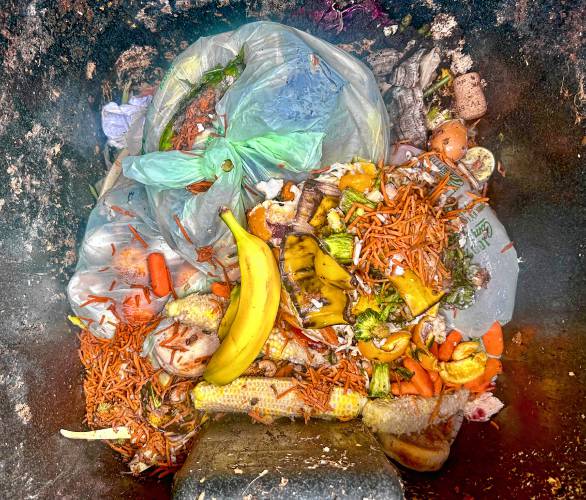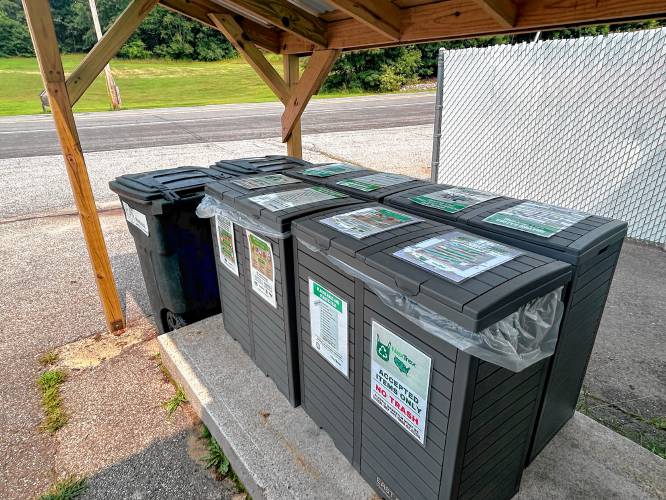Bow’s composting program struggles with low participation, fails to cover costs
| Published: 09-22-2024 12:00 PM |
Every week, compost bins stationed outside Bow’s community center building fill with the remnants of daily life — eggshells, banana peels, zucchini tops and even the occasional wine cork.
Since the town launched its composting pilot program last July, more than 15,000 pounds of organic waste have been collected, diverting it from landfills.
Despite the community’s participation, the program hasn’t quite hit its financial stride – signups have plateaued.
“It hasn’t grown exponentially,” said Sherri Cheney, chair of the Bow Recycling and Solid Waste Committee. “It took a little bit to catch on, but then it’s been mostly steady.”
Cheney believes Bow could reach the point where the initiative becomes self-sustaining if more residents participate.
The town runs its compost program with Renewal Garden and Compost, a residential and commercial pick-up service, using two 64-gallon toters. The company contracts with residents, municipalities and businesses to collect compost and then turn it into a nutrient-rich mixture that goes back into the soil at community gardens and local farms in New Hampshire to grow plants.
Meagan Saviano from Renewal Garden and Compost said that Bow and New London are currently the only two municipalities in New Hampshire that have contracts with the company to collect food waste for composting.
But, drop-off locations, like the one at Concord Food Coop, are available in other towns.
Article continues after...
Yesterday's Most Read Articles
 New Hampshire legalizes public alcohol consumption in designated ‘social districts’
New Hampshire legalizes public alcohol consumption in designated ‘social districts’
 New Hampshire providers brace for Medicaid changes that reach beyond healthcare
New Hampshire providers brace for Medicaid changes that reach beyond healthcare
 Warner town administrator granted restraining order against selectman
Warner town administrator granted restraining order against selectman
 Hotel makeover underway in downtown Concord
Hotel makeover underway in downtown Concord
 Opinion: Dear Gov. Ayotte, let’s talk about the books
Opinion: Dear Gov. Ayotte, let’s talk about the books
 State rules Epsom must pay open-enrollment tuition to other school districts, despite its refraining from the program
State rules Epsom must pay open-enrollment tuition to other school districts, despite its refraining from the program
“There’s definitely an increasing interest in New Hampshire, but it's also slow compared to our surrounding towns,” said Saviano.
Each Tuesday, one toter at the community center in Bow is nearly overflowing while the other is about half full. But, that’s not quite enough to fully cover the program’s costs.
The program costs $104 per month, amounting to $1,248 annually for weekly compost pickups. In comparison, if the waste were sent to the Wheelabrator incinerator, the town would only pay $711.36 per year, based on a tipping fee of $90 per ton.
Although Bow isn’t yet breaking even, it is making progress. The program has managed to offset 57% of its costs by reducing the amount of waste sent to the incinerator.
According to Cheney, if both toters were consistently filled each week, the savings from reduced tipping fees could cover 85% of the composting program’s expenses.
But Bow’s commitment to sustainability doesn’t stop there. The town has embraced single-stream recycling, placing bins at the community center for a variety of items — from razor blades and plastic cups to spray bottle trigger heads.
These efforts are part of a larger recycling initiative managed by Terracycle, a company known for handling tricky waste.
The most popular items recycled through this program in Bow are fruit and vegetable-filled squeeze pouches.
Cheney said each month, Bow sends off a box of these pouches, ensuring they are properly recycled.
Additionally, Bow participates in NexTrex’s program, which specializes in recycling plastic film and clear plastic bags. When a community collects 1,000 pounds of these hard-to-recycle plastics, NexTrex rewards them with a new bench.
Over the past year, Bow has significantly broadened its recycling programs and is continuously introducing new initiatives. Although these efforts may not have substantially impacted the town’s finances, they represent meaningful strides toward a more sustainable future.
“It’s definitely also for the environment,” said Cheney. “I think it’s good for everybody to think about these things and do what they can.”
Sruthi Gopalakrishnan can be reached at sgopalakrishnan@cmonitor.com









 NH judge decides to pause Trump’s birthright citizenship order
NH judge decides to pause Trump’s birthright citizenship order Canterbury honors ‘real heroes’ with updated Military Veterans’ Project
Canterbury honors ‘real heroes’ with updated Military Veterans’ Project Look, up in the sky! It’s… an Airstream trailer?
Look, up in the sky! It’s… an Airstream trailer? Around Concord: Over The Moon Farmstead brings mead, beer, pizza and music to Pittsfield
Around Concord: Over The Moon Farmstead brings mead, beer, pizza and music to Pittsfield
